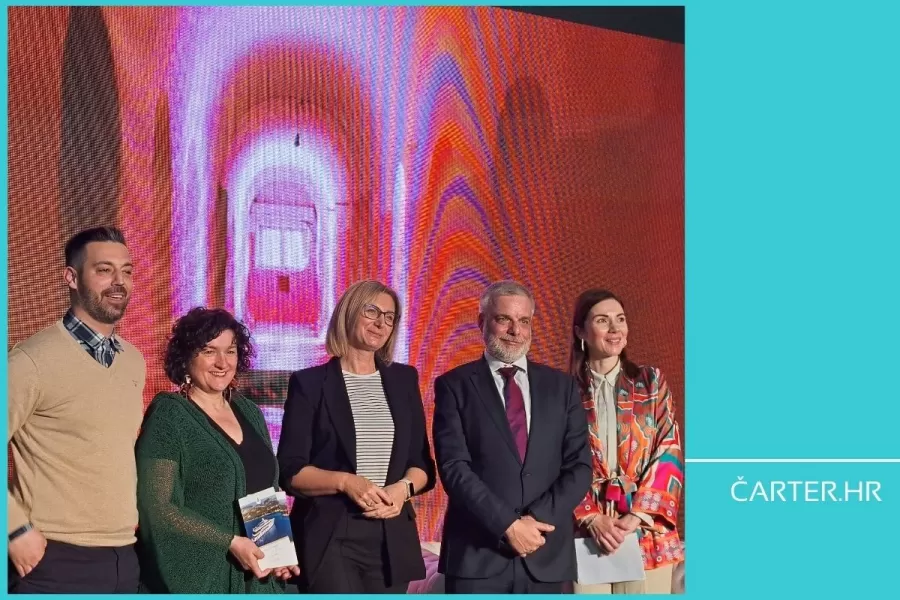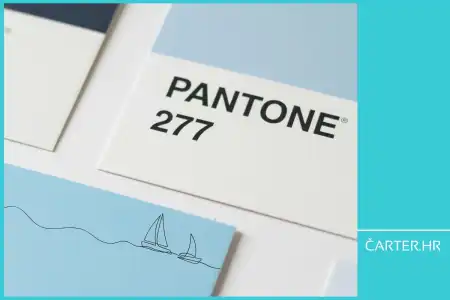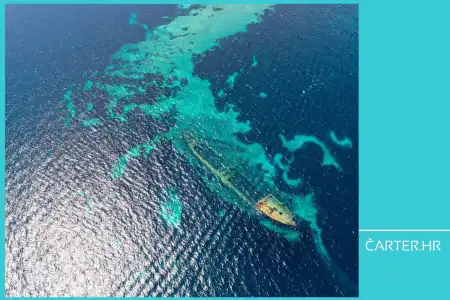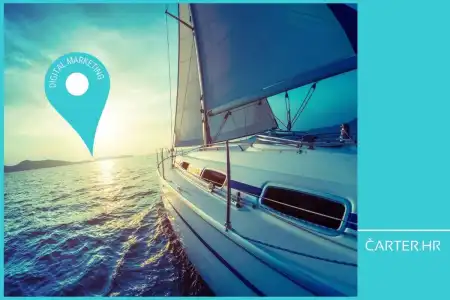
- 30.03.2023.
- News
Does Croatia have the potential for the development of year-round nautical tourism, and if so, is it something we really want? Find out what was discussed about this and other topics at the Nautics 240+ panel during this year's edition of the Place2go tourism fair in Zagreb.
The main topic at the Nautics 240+ panel, which took place as part of the Place2go International Tourism Fair, was the possibility of extending the nautical season on the Adriatic. The panel participants shared their experiences in nautics and charter and highlighted the challenges they face in their work.
The panelists were Luka Kalember, head of the yachting department of the Ban Tours Yachting company, Danijela Podhraški, owner of the Danyelle Yachting agency, prof. Juraj Bukša, director of the ACI Nautical Department and Marija Vukelić, wine expert and enthusiast, moderated by Selma Čmelik, founder of the čarter.hr platform.
The panel aimed to highlight Croatia's potential for the development of year-round nautical tourism, and all participants had their own unique insights on the topic of seasonality, but also on the future of Croatian nautical development.
The main obstacle to seasonality in Croatian tourism
The panel started with the question about what in charter (except the weather conditions) represents an obstacle for evenly dispersed guest arrival, so that we do not have so much pressure during the peak season.
Luka Kalember said that, as a rule, the charter season lasts from the second half of March until the middle of October, which is actually excellent for the strategic orientation of seasonality.
However, there are two problems that Kalember sees in the charter - the difference in the amount of energy that the charter companies would like to invest, and on the other hand, the amount of energy that can realistically be invested.
"The consequences of the pandemic and the downtime that occurred are still being felt, but not through booking and the number of reservations, because that definitely came into its own, but in yacht orders, delivery of goods and with employees. Dealing with these kinds of problems takes energy and leaves less energy for other things."
Kalember said that the second and more expensive problem is a systemic challenge. Until we learn how to find common topics in a smarter and more specific way, we will hardly be able to respond to the guests’ needs in a productive way. He believes that the guests’ needs should be equally addressed, both those who come in the peak of the season and those who come in the pre-season.
Who will be the one to make the first move?
Charters have their own perspective and a specific view of the state of the nautical season, but when we talk about infrastructure needs or the lack of them, the opinion was expressed by prof. Juraj Bukša, who said that for a true nautic picture, one should go back to the very beginnings of tourism in Croatia.
"Croatian tourism was generally established during the Yugoslavian era, and the concept was summer, sun, sea and private accommodation during school holidays. This same paradigm has been going on for 60 years, and a change in concept cannot happen overnight or in a few years, but the changes will last for several decades".
Changes are, of course, carried out by a critical group, said prof. Bukša. And a critical group of dissatisfied people. But it is not entirely certain whether our tourism is ruled by dissatisfied people. People who live from tourism spend 7 weeks working, and he jokingly said that he is not sure if these same people would want to work that extra, eighth week.
"In order to change the paradigm, we have to change the tax system and a lot of other things, it's not just mindset; let's build a marina and here there are new people and ships. Guests will come because they want to come, and we should also change the concept of tourism. But the vast majority of people only want it just like that".
Each destination lives its own life, and the marina raises the destination
ACI with its 22 marinas on the Adriatic (for now) is a system where marinas are integrated into the destination, and not a destination integrated into the marina. Marina lives the life of each destination and improves it.
The Ičići marina was given as an example, as at the time it was being built there were protests against its construction, and today it would probably be the same - if someone told us that the marina is going to close. Prof. Bukša says that the marinas were built in the 80s and 90s, and since then nautics has changed drastically. Back then, marinas were built for vessels of around 15m, and today the average length of vessels in marinas varies from 16 to 18m. At the time the marina was built, catamarans were unknown, let alone trimarans. While today the share of catamarans is 30-40% of the market.
The marinas are "smaller", the guests are different. Today there are no sailors, but the guests are people who come with 3 families because it is cheaper for them to rent a boat than a hotel. They don't want to sail; they want an apartment on board. The professor pointed out that we can discuss the extension of seasonality in principle, but he is not entirely sure that this is a real desire.
"Many things that are normal in the world, for example 80% of the income of a marina in the world is non-core business, i.e. it has nothing to do with the mooring service in the marina. However, Croatian law simply does not allow this, and that is why we are in the present situation. But Croatian tourism has a tradition of more than 60 years that it has its own purpose and should continue to follow its own path. Although, there are no more sailors, or at least the real ones."
The image of our tourism is not bad, but it could be better. But do we really want that?
The topic continued with the question of whether it is possible to make the infrastructure as a kind of combination of European marinas that have the possibility of making money with external services, that is, whether it is possible for Croatian tourism to be at least on that track.
Prof. Bukša presented several very positive examples, such as the marina in Split, where the arrangement of the west coast made the city a serious nautical center. He concluded that extending the season is already possible, but in larger or more attractive destinations such as Split or Rijeka, big cities that ‘live’ all year round.
"Serious sailors with a lot of spending power will be more oriented to the big cities due to their urbanity and infrastructure, but also because of the regattas, which are serious projects that expand the offer. But organizing a more serious event is not possible from a small area where a small bakery works in the off-season. However, it is not the destination's fault, it is simply its life and the way it functions. But that will change when it becomes a necessity to work more than those 7 weeks in the season."

The luxury segment of yachting and some other type of guests
As an obstacle to development in the luxurious aspect of yachting, Danijela Podhraški sees the fact that luxury as a concept does not exist at all, because the term luxury is often misunderstood in our country.
"Not every 20m plus boat is luxurious. Luxury is not the same in the case of every boat and not everything should be put in the same basket. The luxury segment does not really exist in our country".
Danijela stated that as a booking agent she encounters countless situations where the guest asks what luxury can be offered to them on the mainland, such as the offer in the form of luxury stores which are almost non-existent in our country.
"Extending the season is difficult and unfeasible, when we are talking about large boats with a crew. The problem is when the season ends, the crew is disbanded, the boats go for refit or repair. The agencies do not have an available boat to offer until the beginning of May.
With our natural resources, clean sea and islands, we are competitive, but more work needs to be done on what is offered to the guests on land, especially those who come for the first time and want to experience the destination.
France, Italy and Greece have much more developed facilities on land, and we are above them in terms of natural beauty. So, we can compete with them in any case."
The formula for the success of extending the season - you must dare
Marija Vukelić, on the other hand, pointed out that it is possible to use the advantages of the pre-season and post-season and she succeeds in that. She offered something new to her guests, where she organizes a special program of wine cruises. In the middle of the pandemic, she realized "sparkling breakfasts" on land, and she extended this idea even further to the sea. She connected with one shipper with something completely new and noted that she was lucky enough to find people who wanted to get out of their usual practice and comfort zone.
"It was not difficult to make an agreement with winemakers for an event or tasting, because wineries are always at the same location."
Her tours are held at the end of April and at the end of the season, so when everyone sails into the marinas, her tour is just about to start.
"My target group were people like myself. I asked myself - where would I go now? What is there in the world, and could it be done with quality?".
The wine cruise project targets people who want to come to the Adriatic before and after the season when there are no crowds, and then is much easier to arrange everything with winemakers and restaurants, and even open for work "out of season "because they are not crowded at that time. They work more relaxed and can devote themselves better to the guest. The program is designed to provide wine tourists with an experience that they will not be able to experience in the peak season, because both wineries and restaurants are at their busiest then.
"The most important thing is the content in order to extend the season, to offer something different and at a time that no one has offered".

How to break free from the "uniformed" charter world
In continuation, we touched upon the question of whether it is possible to offer special programs and more diverse offers, that is, break out of the uniformity of the charter world, unified charter fleets with a small difference in the equipment of the boats. What is the charterers' viewpoint about it and how to stand out of the offer?
Luka Kalember said that they have a saying in charter "The ship is not a problem, except...". He said that apart from the fact that the ship must be maintained, equipped and have adequate support, the ship should be seen as a means of gaining experience.
"Although we have some "classic" things like short-term rental or much more flexibility in terms of booking, that's what sets us apart. Even before and after the season, it can generate additional income and remediate some risks in the peak season."
He believes that it is best to attract someone's attention and stand out with what no one is talking about, and that is why this extended season is a potential advantage.
The moderator of the panel, Selma Čmelik, added that the trend of domestic guests is on the rise, it is no longer as unattainable as it used to be. Before, it was out of mind to talk about 3 days of booking, charters didn't even want to hear about it, and today it a trend of short sailing trips is almost completely normal, and it was popularized by Slovenians because we are close to them as a destination.
Integration of the marina with the destination
It turns out that everything north of Zadar is uninteresting to sailors because of the destination, while the middle and southern Adriatic are popular because of the indentation of the coast, bays and beauty. The question arose whether ACI's Rijeka marina, with its integration with the city, would be that small step above for the yachting clientele as a desirable destination. Prof. Bukša said that the construction of the marina changes the entire concept of tourism in Rijeka.
"The destination lives its own life. The basic idea is for the marina to be an integral part of the destination. One of the key disadvantages of all marinas is that they do not have options for mooring super luxury yachts of 100m and similar ones. In the Mediterranean, there are no such connections at all, or they have been waited for decades. At one point, Rijeka will offer 15 such moorings at once".
Therefore, Rijeka as a city will have to become ready for development towards the marina, because nautical tourism needs employees in the marina, for maintenance, providing services on vessels and guests. It is considered that the infrastructure of the marina will raise the entire city to a new level.

It is necessary to work systematically on training people
The world is changing at an incredible speed, and it is certain that part of the jobs will be replaced by artificial intelligence. But some jobs and some work force cannot be replaced. The participants of the panel believed that new challenges are coming together with solutions.
The problem of manpower is a problem of the moment that can be solved, and nautical industry will develop accordingly.
The transformation of tourism is inevitable, and the work force problem is a reality that is happening now. But the question arises whether the foreign workforce, which is increasingly on the coast, will be able to present the service or our country properly and whether the employer is able to train such a workforce.
Prof. Bukša simply said: "An employer who fails to adapt will fail. As simple as that. But these are only challenges, not problems".
Luka Kalember reffered to that topic saying that they also have challenges of this type, but these are all changes that need to be monitored.
"In the past, the employer chose the worker, but today the employee chooses the employer. There was a gap due to the arrival of foreign labor and the departure of a very large number of our labor force abroad. But that will be fixed very quickly and the market will adapt".
Marija Vukelić stated that the staff she works with are happy to be educated and there is motivation for advancement. The specificity of her work gives an incentive to others to further their education, because many additional possibilities have been pointed out to them.
"I have the opportunity to inspire a whole new niche of people by designing the program and spreading my story. Our program is workshops that offer stories about wines and food, and thus we create an opportunity for education, both for guests and all program participants".
But the secret is in exclusivity, not mass, and that's what makes these stories different.
Danijela Podhraški pointed out that the crew on boats is a special story.
"The biggest issue is that there is no agency that systematically deals with crew training in the luxury segment. Adria Libar is the agency that does that work, but there is still room for a more comprehensive program. The problem of young people going abroad for higher salaries is ignored, while here, for example, I cannot find a hostess to work on a luxury yacht, regardless of the top salary I offer".
In addition to the fact that we have difficulties with staff training, there is also no official association of brokers that would represent interests of this specific branch. There is currently an initiative to establish the association CRO.Y.A, which would represent the interests of Croatian tourism and the Adriatic Sea, but it is only in the preparation phase. On the other hand, the official charter association has recently merged with the marina association and now they operate as a single nautical tourism association.
A natural conclusion arises that brokers should also participate in such an association. One of their main goals is to lobby the ministry to protect their rights.

Conclusion of the "Nautics 240+" panel – Seasonality; yes or no?
The panel was indeed too short for all the current topics that are present in yachting and charters. However, the topic of seasonality brought a common conclusion that the synergy of different segments of nautics can be applied and show themselves "to the outside" more strongly and meaningfully.
Luka Kalember: "The area of collecting, processing, sharing and communicating information should be at the level of the entire destination. Everyone should benefit from it. Every detail has its own substitute, and we should work together to ensure that everything we communicate is available to guests".
Marija Vukelić: "Content, professionalism and cooperation. Healthy competition and fair play. Content for the target guest, and only that way we will see how everything will look like in about 10 years".
Juraj Bukša: "Work, focus and without fear, challenges come, but they are solved".
Danijela Podhraški: "The most important thing is to work as one. I would like to quote a quote that I have s read somewhere recently - the biggest threat to Croatian tourism is those who lead it".
From our perspective, we can say that in order to move things forward towards a clear common goal, more panels like this are needed, as well as actions. At the very least, the profession should sit down together and start talking, to begin with.
Categories of trends
- News
- Sale
- Marketing
- SEO
- Web design
- Social media
- Technology
- Regulations
- Management
- Education
- Finances
- User experience
Newsletter
Sign up for the newsletter and receive the latest trends and tips straight to your inbox





